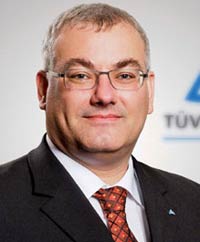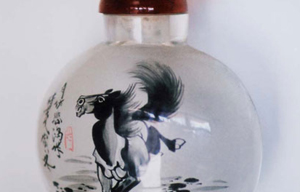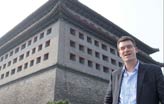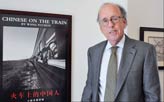Up to the mark
Updated: 2011-09-23 11:46
By Alexis Hooi (China Daily)
Labor shortages, environmental woes, pressure to upgrade and rising production costs - the challenges and changes facing the Pearl River Delta (PRD), one of the engines of China's economic growth, seem greater than ever.
|
 Holger Kunz, head of the EU Chamber of Commerce in China's PRD chapter, has confidence in companies' development in the region. [Provided to China Daily] |
One of these advantages stems from the fact that many European companies made up the initial foreign investment into China following the country's reform and opening-up three decades ago, Kunz says.
"In the very beginning, when China was changing itself, there was a lot of investment coming from these companies. So they are well-established and fairly well positioned," he says.
"But now it is becoming more difficult for European companies to come into China and establish a foothold in the market as more and more local companies continue to improve their processes and productivity, rendering the market increasingly competitive. European companies are also feeling increased pressure from other Asian or Chinese competitors."
| ||||
But the region is now facing multi-faceted issues: rising labor and raw material costs, a shortage of workers, calls for better worker welfare and benefits, industrial pollution, an overdependence on exports and increased efforts by industries and officials to move growth away from the coast to other or less developed inland areas.
"The PRD is one of the earliest areas to develop in China and it is quite well established, but it may not be as diversified as other provinces or regions in the country. In general, it has very strong manufacturing-based industries and is highly focused on household appliances, toys and textiles, IT, batteries and automotive products", Kunz says.
"If you go more to the north of China, you may find more diversified technologies, like wind energy, aircraft manufacturing and photovoltaic industries, are very strong. The PRD region is not only trying to upgrade itself but also to diversify itself. If you look at the industry as a whole in Guangdong, it is still very manufacturing-based. Cities like Shanghai, Beijing, Hong Kong may have more international, bigger companies. The PRD has a strong focus to increase the percentage of tertiary industries.
"Compared with northern China and Shanghai, large numbers of PRD members are small and medium-sized enterprises. There are about nine large cities in the PRD and we have about 300 chamber members here." Kunz says. "As the European chamber, we support these companies by providing them business information, updating on Chinese laws and regulations and providing a platform for dialogue with the government."
Kunz says that is also why there are growth opportunities in the region for European companies like TUV Rheinland, where he serves as vice-president of its Greater China operations.
TUV Rheinland, based in Germany, is a global player in the technical, certification and services sector. The company's businesses include product testing, management system evaluation and quality assurance for areas like renewable energy. It started its operations in China in the 1980s and now includes testing centers and services for electrical product safety, food, batteries, chemical, toys and textiles, medical and visual display segments in the PRD. Kunz leads more than 1,660 employees, of whom 95 percent are Chinese.
"Twenty years ago, when TUV Rheinland entered the Chinese market, we mainly did safety testing for manufacturers so that they were also able to export products from the PRD to global markets, such as Europe, North and South America, Australia, Africa and Asia. Now we offer our customers more services. We support them on the whole supply chain. We look at their products not only from a safety point of view, but also from a 'fitness-for-use' point of view, which means we check how long the product can last in the market; we look at whether the product we tested and certified is the same product that is finally exported and placed in the shelves of retailers. We offer our clients all services for all target markets as a one-stop shop."
Kunz, who has been in the region for more than 15 years and now lives in Shenzhen together with his wife and three children, says China generates about 13 percent of the company's global revenue and the profits from Greater China form an even larger percentage of the group.
"Among the seven regions of the TUV Rheinland Group, China is the largest region outside of Germany. It holds one of the highest expectations and is the highest investment we make in the group outside of Germany," he says.
Lapses in product safety and quality of Chinese products that have begun to resurface recently in areas such as foodstuffs and elevators also mean that the government and related businesses are giving more priority to the work that TUV Rheinland does.
Chinese and German officials are already increasing cooperation and rolling out working groups for standardization and product safety as well as the harmonization of certification systems, Kunz says.
"Also, under the umbrella of the European Chamber, we have been discussing with the government representatives in the PRD to see how we can have more dialogue between the government and certification industry. We would like to have more dialogue and more agreements on how to ensure product safety. So that the consumer is eventually safer and more satisfied," he says.
"I feel, not only as chairman of the European Chamber's chapter here but also being with TUV Rheinland, that there is an interest from the Chinese side to have more dialogue in the area of consumer products."
Green technologies are also very much the focus for his company in China as companies continue to find ways to stay competitive in the global market, Kunz says.
"We started with green services very early. We are the largest player worldwide in terms of the testing of photovoltaic, not only modules but also complete systems. And with that, we have a fairly good market position in China for export manufacturing but also for the local market," he says.
"Of course, we are looking at the local market very much and it needs to deregulate so there are a lot of services we can already offer our customers today. But when it comes to mandatory services, those are something where the market has to open a little bit more so that more services can be offered."
E-paper

The snuff of dreams
Chinese collectors have discovered the value of beautiful bottles
Perils in relying on building boom
Fast forward to digital age
Bonds that tie China. UK
Specials

Let them eat cake
Cambridge University graduate develops thriving business selling cupcakes

A case is laid to rest
In 1937, a young woman'S body was found in beijing. paul french went searching for her killer

Banking on change
Leading economist says china must transform its growth model soon
